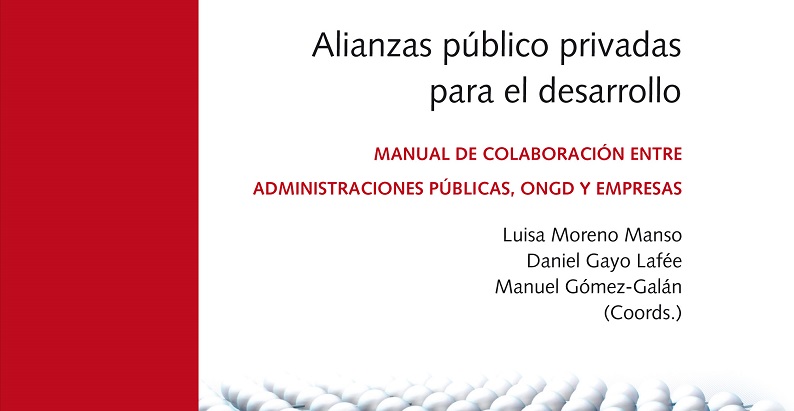-
27 July 2014
Category : Opinion
Private-Public Partnerships in Development Cooperation: A new path to be discovered
In this article, Sara Mercader Perpiñá, from the FIIAPP's Development and Environment Department, and Alexandra Gil Táboas, from the Security and Justice Department, analyze the challenges of Public-Private Partnerships for Development in response to the different perspectives debated in a symposium on this issue held in Madrid.

On 15th July in Madrid, the Presentation – Symposium “Boosting Public-Private Partnerships for Development (PPPDs)”, organized by the CIDEAL Foundation and the non-governmental organization CONEMUND took place. Professionals from the business world and the public sector came together to exchange ideas about this phenomenon. PPPDs, which are becoming increasingly common, seem to offer alternatives to the complicated outlook for international cooperation today in terms of financing, a “stimulating moment”, as one of the speakers described it. Two manuals were also presented at the event, which were offered to the attendees: a “Guide to Efficient Management of Public-Private Partnerships for Development”, published by CIDEAL in collaboration with the AECID, and a “Manual for Collaboration Between Public Administrations, NGOs and Companies”, published by CIDEAL and CONEMUND with the collaboration of the Community of Madrid.
According to the definition in the aforementioned PPPD management manual, they help “consolidate the efforts that Public Administrations, the business sector and organized civil society establish to contribute to improving the quality of life of people and communities”. Along these same lines, in the words of our FIIAPP colleague, Javier Sota, “PPPDs encourage peer learning between the different stakeholders and capacity-building in favour of development”.
A defining characteristic of PPPDs, which distinguishes them from other public-private relationships, is that the stakeholders share objectives, risks and benefits. This means, according to the Foundation for Institutional Development for Social Organizations, that these partnerships tend to be formed based on values of trust, transparency and equality. Values to which the National Partnerships Programme of Colombia adds inclusion and shared responsibility. However, we mustn’t forget that another of their essential features is their wide variability, and that therefore there is no single way to construct a PPPD and that its nature will depend in large part on the nature of the organizations involved in the process.
This phenomenon is not foreign to Spanish cooperation, although it is recent. The Fourth Master Plan (2013 – 2016) published by the AECID, in section V.2 “Challenges for the stakeholders in the system”, explains the importance of creating “inclusive partnerships” among the diverse stakeholders, and of the stronger role of the business/private sector in the field of international cooperation. No doubt this text was inspired by the Busan Declaration and the renewed commitment at the international level that underpins the post-2015 Development Agenda, which contemplates the need for business to consolidate its role in the fight against poverty.
It’s important to emphasize, as expressed by Emilio Villaescusa (ASCES and CEPES), that throughout the process of founding a PPPD, the company cannot lose sight of the partnership’s interest in the “public good”. In this line, PPPDs should guide their action on the basis of public development policies and international poverty-reduction strategies. That is, their objectives should fit into the regulatory frameworks established by governments and competent authorities on the subject.
As a final reflection, the debate on PPPDs brought out the idea that the future of development cooperation lies in considering the business/private sector as an important stakeholder in this field, as it has abandoned its role as a mere witness in favour of participating actively in the process of social development.
The symposium was led by Manuel Gómez-Galán, Director of the CIDEAL Foundation. The speakers, from the worlds of international cooperation and business, emphasized the need to promote the creation of PPPDs. Representing Spanish cooperation, Juan Luis Revuelta, Deputy General Director of Development Cooperation of the Community of Madrid, and Laura López de Ceraín, Director of Multilateral, Horizontal and Financial Cooperation of the AECID, participated. Speaking on the business side were Emilio Villaescusa, Executive President of the group “Association for Social Economy Cooperation” (ACES) and a member of the Executive Commission of the Spanish Business Confederation of Social Economy (CEPES), and, as an expert on “multi-stakeholder strategic partnerships”, Leda Scott, a member of the newly created “alianzas.red”. On a final note, Manuel Pimentel, current President of the Almuzara group, spoke to the attendees about the importance of betting on innovative solutions in light of the challenges facing development today.
The views and opinions expressed in this blog are the sole responsibility of the person who write them.




